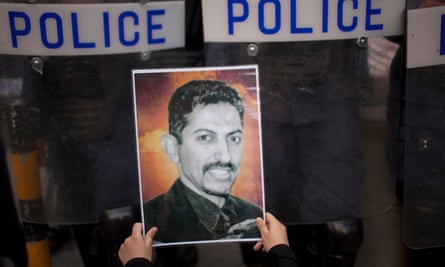[ad_1]
A senior MEP is facing questions over trips to Bahrain and his support for a “one-sided” resolution on a political prisoner from that country that echoes the talking points of the authoritarian Gulf state.
Tomáš Zdechovský, a centre-right Czech MEP, who chairs the European parliament’s Bahrain friendship group, was found by the Guardian to have made an undeclared visit to the country in April 2022, where he met Bahrain’s chamber of commerce.
The controversy has arisen as the European parliament prepares to vote on Thursday on a resolution calling for the release of Abdulhadi al-Khawaja, a human rights activist, who was sentenced to life in prison during the crackdown against 2011 protests in Bahrain.
After a Belgian police investigation into corruption at the European parliament, the Bahrain debate raises different questions about the parliament’s “friendship groups”, unofficial bodies not subject to formal rules, which are sometimes sponsored by lobbyists and foreign governments.
There is no suggestion of illegal activity by Bahrain or Zdechovský, who is leading negotiations on the Khawaja resolution on behalf of his centre-right group, the European People’s party.
Khawaja, a dual Danish-Bahraini citizen who was nominated for the Nobel peace prize in 2013, was subject to arbitrary detention, a UN working group concluded in 2012. The UN group reported that Khawaja had been beaten in prison and suffered four fractures to his jaw.
More than a decade later, Khawaja remains in prison and according to his supporters is facing a campaign of judicial harassment. Last month, he was convicted of two separate offences of breaking a chair and insulting a public servant. Neither he nor his lawyer were present at these trials, according to Amnesty International.
Zdechovský’s EPP has caused astonishment by failing to call for Khawaja’s release in an alternative version of the resolution. Instead, it describes him as a “political opponent”, a former member of a terrorist group and repeats the official charges that he was sentenced for “financing and participating in terrorism to overthrow the government and spying for a foreign country”. In 2012, the UN said it had “serious questions” about the validity of these charges and highlighted their vagueness.
Karen Melchior, a Danish liberal MEP, said that the “one-sidedness of the EPP resolution is throwing up some red flags”. She said accusations of terrorism were intended to tarnish Khawaja’s image. “It is very much along the lines of what the Bahraini government would say if you asked them.”
Another parliamentary source said of the EPP text that “basically what they are saying is what the Bahrain government is saying”.

Last Friday, Bahrain’s embassy to Brussels circulated documents to MEPs, including Khawaja’s purported medical records, that criticised the “inaccurate portrayal of the human rights situation” in the draft resolution.
The Bahrain Institute for Rights and Democracy said the Bahraini dossier did not accurately reflect Khawaja’s health and that he had been denied hospital visits for skin complaints, back and shoulder problems, as well as an operation for facial injuries sustained during torture.
Sayed Ahmed Alwadaei, the institute’s director, accused Zdechovský of acting as a mouthpiece for Gulf dictatorships.
He highlighted Zdechovský’s decision to accept hospitality from Bahraini authorities, when the MEP visited Manama in November 2021 to meet ministers and officials. The four-day trip, including a stay in a five-star hotel, was declared on the European parliament’s website in line with rules on events funded by third parties.
Separately, the Guardian learned that Zdechovský failed to declare a trip to Bahrain in April 2022, when he met the chamber of commerce. Contacted by the Guardian, Zdechovský said he had funded the trip himself, but should have declared it. He said: “The delay in the declaration was a mistake of my office and we are working on redress.”
He said the meeting with the chamber of commerce was not planned before his trip, but suggested by a friend after his arrival in the country.
He promised to send proof that he had self-funded the trip, although no documents had arrived at the time of publication. After publication, he sent screenshots that appeared to show several payments, including for a flight on Emirates Air, from a Czech source. He said they were images from his bank account, adding he was “clean and clear, I am not doing that Qatar shit”.
Alwadaei, a Bahraini dissident forced into exile, said MEPs such as Zdechovský should be clear they have been on trips funded by Bahrain’s government when they speak about the country in the European parliament.
Maryam al-Khawaja, the imprisoned activist’s daughter, released an impassioned video before the vote criticising the MEP: “Tomáš, what is your conscience worth? That you are ready to defame a human rights defender who was brutally tortured and imprisoned for 11 years. How much does it cost to sell your soul over a fellow EU citizen?”
Speaking to the Guardian, Zdechovský claimed he had no role in drafting the EPP resolution, although he supported it and was in charge of negotiating a final text for his group. He said everyone in his group agreed that Khawaja was “not a human rights activist”. The Czech MEP added he had been chosen to negotiate the text because “not many people in the European parliament” had his deep knowledge of the region.
He added that he was “very transparent” about all his trips funded by foreign governments and referred to declarations on his webpage about the November 2021 visit to Bahrain, as well as visits to the UAE, the Maldives and India, paid for by those governments.
Bahrain’s embassy to Brussels had not responded to a request for comment at the time of publication.
[ad_2]




